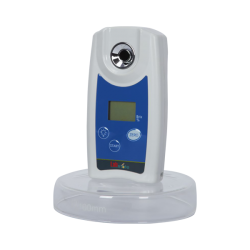
Handheld Refractometer LMHR-401 is a small device with a digital display that shows the variable ranges subjectively and clearly. Its measuring range is between 0.0 to 32.0 %. It comprehensively relies on automatic temperature compensation with the range of 10 to 75℃. It includes a touch button with one unit of measure and a zinc alloy sample cell with a precision glass prism at the bottom.
Get Quote| Temperature Compensation Range | 10 to 75 ℃ |
| Use Environment Temperature | 10 to 40 °C |
| Measuring Range | Brix0.0 to 32.0 % |
| Measurement Accuracy | Brix±0.2 % |
| Sample Size | 0.3ml or more |
| Measure Time | About 3 seconds |
| Solubility | Brix0.1 % |
| Input Power | AAA Battery ×2 |
| Display Method | LCD screen |
| Product Size (W×D×H) | 60×31×113 mm |
| Net Weight | 115 g |
 The sugar content and temperature are displayed intuitively and clearly on the LCD screen
The sugar content and temperature are displayed intuitively and clearly on the LCD screen
 Automatic shutdown after 2 minutes of inactivity, energy, and power savings
Automatic shutdown after 2 minutes of inactivity, energy, and power savings
 Touch button, one-key measurement, 3-second wait time, simple to use
Touch button, one-key measurement, 3-second wait time, simple to use
 Calibration with tap water is an option
Calibration with tap water is an option
 A zinc metals cuvette with a precision glass prism at the bottom
A zinc metals cuvette with a precision glass prism at the bottom
 Strong light and the color of the solution have no effect on the measurement
Strong light and the color of the solution have no effect on the measurement
 Temperature compensation is automatic, and there is a high degree of adaptability
Temperature compensation is automatic, and there is a high degree of adaptability
 There is no cover design, but there is a built-in filter
There is no cover design, but there is a built-in filter
It is suitable for measuring various types of fruit juices, foods, beverages, and certain chemicals or industrial solvents such as cutting oils, cleaning fluids, and antifreeze.
Get Quote for
Handheld Refractometer LMHR-401